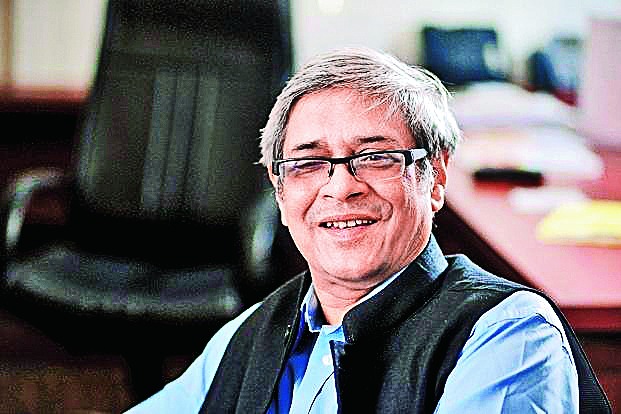
Agartala, Sept. 24:NITI Aayog is preparing a 15-year road map for the economic development of India.
The road map envisages economic and development standing of the country in 2031 and will, accordingly, recommend streamlining different sectors of the economy.
“From reduction of infant mortality rate to improving roads and connectivity and upgrade of infrastructure — the road map will find out how best the public and private participation in the sphere of development can be more symbiotic and meaningful,” said Bibek Debroy, eminent economist and member of the NITI Aayog.
Debroy arrived here to attend a seminar on Connectivity in the Northeast, jointly organised by the Tripura government, DoNER ministry and Ficci. Later, he spoke to mediapersons and said one of the important aspects of the road map would be reduction in the number of departments of the state government to a maximum of 30.
In an indirect rebuttal of the allegations of deprivation in central funds made by Tripura and Nagaland chief ministers Manik Sarkar and T.R. Zeliang, Debroy said the NITI Aayog is not a funding agency.
“The basic idea behind the launching of NITI Aayog was to ensure decentralisation in implementation of development work; we in NITI Aayog can provide intellectual support to states and even the Centre whenever and wherever required,” Debroy said.
On the issue of erasure of plan and non-plan segments of expenditure, he said the 14th Finance Commission had made this recommendation and the same was being acted upon.
On Sarkar’s allegations of reduced funding to the tune of Rs 1,600 crore annually by the Centre, Debroy said the Tripura government has neither formed the mandatory state finance commission, as required by the Constitution, nor furnished utilisation certificates for expenses incurred in 2014-2015 and 2015-2016.
“Forming the state finance commission after submission of recommendations of the Finance Commission is mandatory to assess the funds requirements and nature of expenses of the state government but Tripura has not done so. Besides, it has not furnished utilisation certificates for Rs 475 crore spent in 2014-15 and Rs 116 crore for 2015-16,” Debroy said.
He further said the panel was not preparing plans for states, unlike the erstwhile Planning Commission, but the Centre has formed three sub-committees headed by Shivraj Singh Chauhan, Parkash Singh Badal and N. Chandrababu Naidu — chief ministers of Madhya Pradesh, Punjab and Andhra Pradesh respectively — to look into issues of centrally sponsored schemes, skill development and Swachh Bharat Abhiyan. “Tripura chief minister attended all the meetings and 30 centrally sponsored schemes were finalised but the question of utilisation certificates as per the old system remains and it will be followed till the end of the current financial year,” Debroy said.
He added that submission of the Shivraj Singh Chauhan committee report was followed by letters to all northeastern states, including Tripura, to look into the Finance Commission report as well as the Chauhan committee report and provide information on estimated loss but no report from these states had been furnished till date.
On the abolition of “special category” status for Tripura and other northeastern states, Debroy said the nomenclature of “special category”, introduced by the Gadgil formula in the seventies, had been done away with. However, he said there are two other categories — Northeastern states and Himalayan states — under which funds for centrally sponsored schemes are given on 90:10 ratio.
“If this is considered, there is no actual deprivation. Moreover, the states’ share of funds from the divisible pool has been increased from 32 to 42 per cent,” the economist said.










